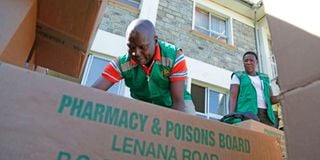Premium
84 illegal pharmacies shut, over 80 arrested in Nyanza crackdown

Officers of the Pharmacy and Poisons Board inspect medicines seized during routine inspections, at their office in Kisumu on December 20, 2019.
The Pharmacy and Poisons Board (PPB) has shut down 84 illegal pharmacies in Kisumu, Nyamira, Kisii, Homa Bay, Migori and Siaya counties.
Dr Dominic Kariuki, the deputy director of inspections and enforcement, said that following a crackdown in that region, they were able to shut down 84 illegal pharmacies and 137 cartons of assorted medicines seized.
“So far, 80 people have been arrested and charged in court with offences such as possession of part one poisons, contrary to section 26(1) of the Pharmacy and Poisons Act,” he said,
The charges included conducting the business of a pharmacist while not registered as one, contrary to section 19(1a) of the Act, as well as doing the business in unregistered premises, contrary to section 23(1) of the Act.
Dr Kariuki said a major concern is absentee superintendents at some licensed pharmacy outlets, who leave the running of pharmacies to unqualified persons, putting the public in danger.
“Professionals found engaging in these malpractices have been summoned for disciplinary action,” he said.
The PPB further gave notice to all pharmacies with expired drugs, asking them to safely quarantine them and get in touch with its regional inspectors for safe disposal.
The board has distributed minilabs to its regional offices for random sampling and testing of medicines in the market to ensure they are of good quality, and are safe and efficacious.
Dr Kariuki added that they have trained health workers and all other stakeholders in identifying and reporting cases of poor quality medicines using the PPB’s tools.





